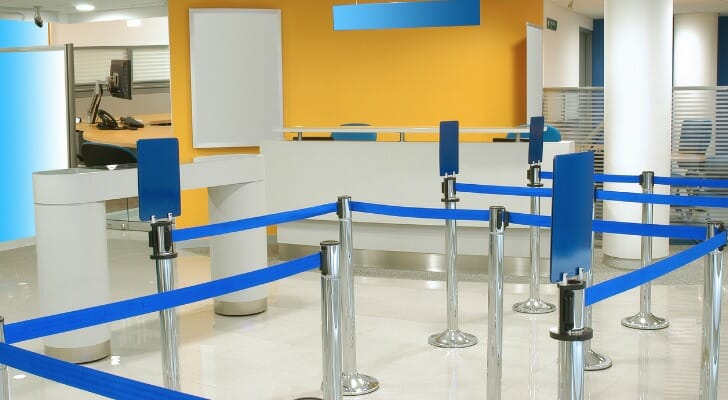To most, Labor Day means a three-day weekend of fun in the sun, barbecues, and special sales at retail stores. However, if you want to visit a bank branch that day, you will find yourself out of luck: banks close on Labor Day. If you need to conduct banking business, you will need to find another way to do it or wait until doors open again on Tuesday.
Consider working with a financial advisor to help manage your finances.
What Is Labor Day?
Labor Day is an American holiday that celebrates workers and the labor movement. Observed on the first Monday of September, it is an official federal holiday, which means all government businesses are closed. Since banks tend to follow the schedule of the Federal Reserve, nearly all banks close their doors on Labor Day and other federal holidays.
History of Labor Day
Labor Day was first declared a federal holiday in 1894. Trade union and labor movements were growing. Unionists proposed a day to celebrate American labor in the early 1880s. Oregon became the first U.S. state to celebrate Labor Day as a public holiday in 1887, and other states followed suit. By the time it was declared a federal holiday, 30 states were celebrating the day.
Today, Labor Day is most commonly associated with the end of summer. Towns celebrate the day with parades and fireworks. Families and friends have barbecues. Those people who live near the coast tend to hit the beach, and retail stores get in on the action with big sales. Kids also tend to start the new school year around Labor Day, either the week before or after the holiday.
It’s a busy time of year when you may need the bank, but may not find the type of access you need.
Federal Holidays Mean Banks Are Closed
Labor Day is one of 12 federal holidays in the year. The rest are New Year’s Day, Martin Luther King Day, Inauguration Day, Presidents’ Day, Memorial Day, Juneteenth National Independence Day, Independence Day, Columbus Day, Veterans Day, Thanksgiving and Christmas Day. On each of these federal holidays, government entities are closed in observance of the day, and banks follow suit.
If you think you may need to go to a bank branch around Labor Day, it is important to keep in mind that many banks will be closed on Sunday, the day before, as well. Banks, in general, are closed on Sundays with a few exceptions. Many banks also have shortened hours on Saturday.
If you are hoping to conduct banking business on Labor Day weekend, your best bet would be to get everything done by Friday or make sure you get there during Saturday hours. Otherwise, you might have to wait until Tuesday.
What Banking Services Still Work on Labor Day?

While in-person banking is unavailable on Labor Day, many scheduled services and background operations continue running. If you have set up automatic bill payments, recurring bank transfers or direct deposits in advance, these typically process on schedule, even on bank holidays. This helps keep your financial obligations on track without needing to visit a branch.
Bank holiday schedules can sometimes affect cutoff times for certain actions, such as processing wire transfers or mobile deposits initiated just before or during the holiday. These may be delayed until the next business day, so it is best to plan ahead if timing is important. If you are unsure, review your bank’s processing policies before the holiday.
Customer support through automated systems and chat services may still be partially available. Some banks provide limited holiday access to phone menus or virtual assistants that can answer questions about account balances or recent transactions. Although live customer support may be paused, these tools can still offer guidance.
In addition, external services tied to your bank, such as automatic investment contributions or mortgage payments, are often set to run on business schedules and may skip holidays. Check with any linked service providers to confirm their handling of Labor Day processing, especially if you are managing payments tied to non-bank institutions.
How to Access Your Money When the Bank Is Closed
If you need to get cash out when your bank is closed, don’t worry!
You should have access to cash at any time with your debit card at an ATM. Most banks have a separate ATM area that is accessible even when the branch itself is closed. You do not even have to go to your own bank to access your account; you can use your debit card in any ATM, though there may be a fee associated with doing this.
If you need to make account transfers, check your account status or other simple banking transactions, you can do this on your bank’s online banking portal or mobile banking app. Most banks have a website where you can sign up to access your account online. From there, you can do many of the things you used to have to go to the bank to complete. Many banks even offer remote check deposit with their mobile apps.
Bottom Line

Banks are closed on Labor Day because it is a federal holiday. However, you can still access your account by withdrawing cash at an ATM or logging onto your online banking system or bank’s mobile app. If you really need to get to the bank, try going the Friday or Saturday before the holiday.
Consider working with a financial advisor who can help you organize your finances.
Money Management Tips
- Your bank account is just one small part of your overall financial picture. If you’d like to build a financial plan, we’d recommend finding a financial advisor. If you don’t have a financial advisor yet, finding one doesn’t have to be hard. SmartAsset’s free tool matches you with up to three vetted financial advisors who serve your area, and you can interview your advisor matches at no cost to decide which one is right for you. If you’re ready to find an advisor who can help you achieve your financial goals, get started now.
- Want a bank that never closes? You might open an account at one of the many online banks, which have no branches but robust online and app offerings. And many of the highest-interest bank accounts can be found at these online banks.
Photo Credit: © iStock / Kameleon007, © iStock / karammiri, © iStock / marchmeena29
